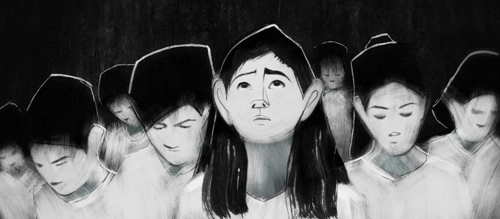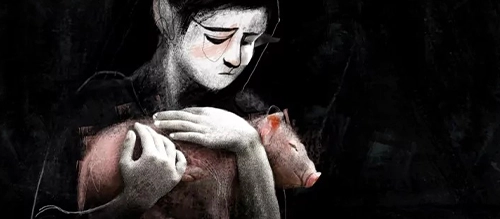Letter to a Pig (2022) Short Film Review

Letter to a Pig (2022)
Director: Tal Kantor
Screenwriter: Tal Kantor
Starring: Moriyah Meerson, Alex Peleg, Indra Maharik, Ayelet Margalit
Traditional 2D animation, painted frames and live-action segments combine to bring to life observations of generational trauma in this 2024 Oscars Animated Short nominee telling of a girl, a speaker and a pig.
Letter to a Pig centres upon two characters, Haim (Alex Peleg) and Alma (Moriyah Meerson). Haim is an elderly Jewish man reading a letter of thanks he wrote to a pig he believes saved his life from the Nazis when he hid in its pigsty during the 2nd World War. Alma is one of the school classmates he is reading to. We get lost in Alma’s imagination as Haim reads the letter, and we witness Alma and her fellow children living in fear of the pig, chastising the pig, tying the pig up, and ultimately freeing the pig, in a prolonged fantasy sequence representing how generational trauma can affect contemporary thoughts and behaviours.
There is, of course, an immediate relevance to exploring how the holocaust can effect modern perspectives and influence decisions. And World War II is in no doubt pertinent to the current filmmaking sphere given the relative box office success of One Life in the UK in January and the Oscars Best Picture nomination for Auschwitz drama The Zone of Interest at the 96th Academy Awards. Letter to a Pig can’t claim to be as affecting as either of those critically acclaimed features, but its unique route to its message ensures it is a strong standalone art piece.
Director and screenwriter Tal Kantor, who previously worked as an animator on feature documentary Advocate (2019) about a Jewish-Israeli human rights lawyer, brings her unique stylistic signature to this short film (with the help of fellow animators Meton Joffily and Anne Kraehn), presenting her story in the same style and with the same tempo as in Advocate and her previous short film In Other Words (2016). In a Making Of featurette published by BANG BANG, Kantor described how her characters are fragmented and incomplete to represent the bits and pieces we might remember of the past and how we combine generational trauma into one vision within the young generation’s subconscious. This film is largely white with black strokes representing key characteristics, the palette largely inverted in the fantasy sequences, the only colour being present in the objects representing the generational trauma and the hope of setting it free.

Live-action segments shot on green screen help to illuminate meaning and perspective in this aesthetically unusual but interesting piece. We see the reflections of real eyes during the pigsty scene, which help to ensure our empathy is reached, and then the hands of Haim are live-action against his animated face and body as he tells his story to the classroom of animated students. We see a mix of real pig and animated pig, too, all projected onto animated backgrounds often absent of colour, props, or any kind of detail. This is all in an attempt to bring focus to the characters and themes at hand, and to represent the feeling of remembering or imagining. A by-product is that no other Animated Short nominee looks like this.
The pig to whom the letter is written is positioned within the narrative as an unlikely ally, and is intentioned to be representative of the ideological confusion that comes with generational trauma: who is good? Who is bad? What makes a human being a human? What makes an animal an animal? This works well to construct an emotional heart to this piece that is largely concerned with presenting its theory as opposed to making you feel, but the pig’s positioning as an item onto which thoughts, ideas and perspectives can be projected speaks of a generalisation of pigs as “less-than” in such a manner that seems reductive and almost stereotypical, which is in stark contrast to the film’s more admirable aspects, such as its visual presentation.
And that’s the story of this Animated Short nominee: it’s beautifully put together, is imaginative with the form of animation, and is a unique visual experience, but its story comes across as lecturing rather than encouraging and it lacks the thematic depth of some of its fellow nominees. There is a lot to love about Letter to a Pig, but it is not an emotionally resonant story of trauma you’ll connect to and cry about like other Oscars nominees (in the short and feature categories) have been in recent years.
Score: 15/24

